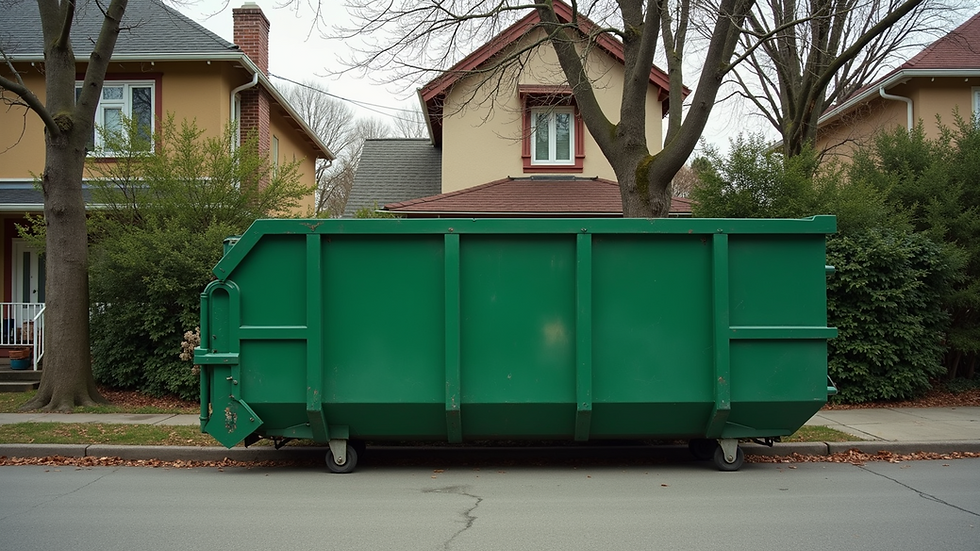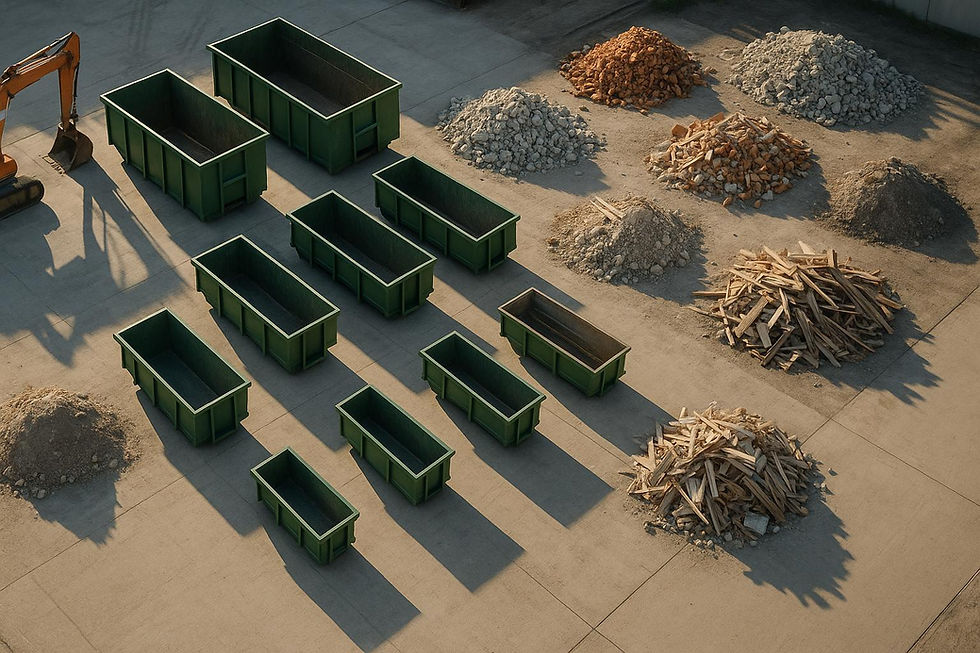
Residential vs Commercial Dumpster Rentals: Key Differences
- Gregory Cunningham
- Mar 3, 2025
- 6 min read
Updated: Apr 23, 2025
Need a dumpster but not sure which type suits your project? Here's a quick guide to help you decide between residential and commercial dumpster rentals:
- Residential Dumpsters: Best for smaller, short-term projects like home renovations, yard cleanups, or decluttering. Sizes range from 10 to 20 cubic yards, with typical rental periods of 3–7 days.
- Commercial Dumpsters: Designed for large-scale, ongoing projects such as construction sites, manufacturing, or office cleanouts. They hold 30 to 40 cubic yards and are rented for weeks or months.
Quick Comparison
Feature | Residential Dumpsters | Commercial Dumpsters |
Size Range | 10–20 cubic yards | 30–40 cubic yards |
Typical Projects | Home cleanouts, yard work | Construction, industrial use |
Rental Duration | 3–7 days | Weeks to months |
Waste Types | Household debris | Heavy construction materials |
Key takeaway: Residential dumpsters are perfect for smaller, temporary needs, while commercial dumpsters handle large, long-term waste disposal.
Types of Commercial Dumpsters
Residential Dumpster Basics
Residential dumpsters are a practical solution for handling waste during home projects. Unlike their larger commercial counterparts, these dumpsters are designed to fit comfortably in driveways or yards, making them ideal for residential use. Here's a closer look at their common uses and size options to help you decide.
Common Home Project Uses
Residential dumpsters are perfect for a variety of home improvement and cleanup tasks. Some typical uses include:
- Home renovations: Disposing of cabinets, drywall, flooring, and other materials.
- Yard cleanups: Clearing away branches, leaves, and landscaping waste.
- Garage cleanouts: Getting rid of old furniture, appliances, and miscellaneous household items.
- Small construction projects: Managing debris from minor home additions or repairs.
Size Options and Placement Tips
Choosing the right dumpster size depends on the scale of your project. Here's a quick guide:
Dumpster Size | Ideal For |
10 cubic yards | Small renovations or yard cleanups |
15 cubic yards | Medium-sized projects like garage cleanouts |
20 cubic yards | Larger cleanouts or major renovations |
When planning for a dumpster, make sure you have a flat, sturdy surface for placement - like a driveway or a section of your yard. This ensures safe access for delivery trucks and keeps the dumpster stable during use.
Finally, consider how long you'll need the dumpster. Most rentals are available for short-term use, typically a few days to a week, but many providers offer flexible timelines to suit your project needs.
Commercial Dumpster Basics
Residential dumpsters are great for smaller, short-term projects. But when it comes to handling larger, ongoing waste disposal, commercial dumpsters are the go-to solution. These heavy-duty containers are designed to meet the high-volume waste needs of businesses and large-scale operations.
Business and Industry Uses
Commercial dumpsters are used across various industries for different purposes. Here's a quick breakdown:
Industry | Primary Uses | Typical Rental Duration |
Construction | Building materials, demolition debris | 2–3 months per project |
Manufacturing | Production waste, packaging | Ongoing contracts |
Retail | Cardboard, packaging, general waste | Weekly or monthly service |
Office Buildings | Furniture, equipment, paper waste | Project-based or ongoing |
Size and Weight Capacity
These dumpsters typically hold 30–40 cubic yards of waste and are built with reinforced steel to handle heavy, bulky materials. They’re perfect for:
- Handling heavy materials like concrete or steel.
- Disposing of large volumes of manufacturing waste.
- Managing mixed commercial debris, including industrial equipment.
Things to Consider
Before renting a commercial dumpster, keep local regulations in mind. Many municipalities require permits, especially if the dumpster will be placed on the street. You’ll need to ensure all documentation complies with local waste management rules.
To choose the right dumpster, evaluate your weekly waste volume and any peak disposal needs. Depending on your business, you might need one large dumpster or multiple smaller ones to keep everything running smoothly.
Comparing Residential vs Commercial Dumpsters
Residential and commercial dumpsters differ in size, rental terms, and the types of waste they handle. Below, you'll find a breakdown of these differences to help you choose the right option for your needs.
Size and Use Comparison Chart
Here's a quick look at how the two types compare:
Feature | Residential Dumpsters | Commercial Dumpsters |
Size Range | 10-20 cubic yards | 30-40 cubic yards |
Typical Projects | Home renovations, yard cleanups, decluttering | Construction sites, manufacturing facilities, office cleanouts |
Weight Capacity | Light to medium materials | Heavy construction debris, industrial waste |
Rental Time Options
Residential and commercial dumpster rentals come with different timeframes to suit their purposes.
- Residential Rentals: Typically available for 5-7 days, perfect for short-term projects like home cleanouts or minor renovations.
- Commercial Rentals: Offer more flexible terms, including weekly service contracts, monthly arrangements, project-specific durations, or even long-term waste management solutions.
Accepted Waste Materials
The type of waste you need to dispose of plays a big role in your choice of dumpster.
- Residential Dumpsters: Handle household renovation debris, yard waste, general cleanout items, and basic construction materials from DIY projects.
- Commercial Dumpsters: Designed for heavy-duty materials like construction debris, manufacturing waste, demolition debris, and industrial equipment.
Both types prohibit hazardous materials, but commercial dumpsters often have stricter guidelines due to regulations.
Selecting Your Dumpster
Choosing the right dumpster involves weighing a few key factors. Based on the differences outlined earlier, here's how to pick the best option for your project while keeping cost, efficiency, and waste management in mind.
Matching Dumpster Size to Your Project
Use this guide to find the right dumpster size for your needs:
Project Type | Recommended Capacity | Typical Rental Period |
Small Home Cleanout | 10-15 yards | 3-5 days |
Full Home Renovation | 15-20 yards | 5-7 days |
Commercial Construction | 30-40 yards | Weekly/Monthly |
Industrial Cleanup | 40+ yards | Extended rental |
For most residential projects, a 15–20-yard dumpster is a solid choice. Larger commercial or industrial jobs will likely need higher capacity. Don’t forget to consider the amount of debris and any weight restrictions that might apply.
Factors Impacting Cost and Recycling Options
Dumpster rental costs can vary based on a few factors:
- Rental Duration: Short-term rentals (3–7 days) typically cost less than long-term agreements.
- Size: Bigger dumpsters mean higher rental and disposal fees.
- Type of Waste: Mixed waste is often pricier to dispose of than sorted recyclables.
- Location: Delivery fees can increase with longer distances.
Opting for recycling-specific dumpsters can help reduce disposal costs. Look for services that simplify the rental process while prioritizing waste sorting.
Dump & Go Service Features
Dump & Go specializes in hassle-free dumpster rental and waste management services across New England. Here’s what they offer:
- Quick Delivery: Timely scheduling to keep your project running smoothly.
- Size Variety: Options include 15–20-yard dumpsters, ideal for residential and smaller commercial jobs.
- Recycling Support: Proper sorting and recycling practices to reduce waste.
- Comprehensive Service: Delivery, pickup, and disposal are all handled for you.
- 24/7 Availability: Emergency services available for unexpected cleanup needs.
Their insured team takes care of everything from placement to removal, ensuring safe and compliant waste management throughout your rental period.
Summary
Main Points Review
Here's a quick breakdown of how residential and commercial dumpsters differ:
- Residential dumpsters (10–20 yards, 3–7 days) are ideal for smaller projects like home renovations, yard work, or cleanouts.
- Commercial dumpsters (30–40 yards, weeks to months) are better suited for larger-scale needs like construction sites, manufacturing, or office cleanouts.
Take a look at the key differences:
Feature | Residential Dumpsters | Commercial Dumpsters |
Size Range | 10–20 yards | 30–40 yards |
Typical Projects | Home renovations, cleanouts, yard work | Construction sites, manufacturing, office cleanouts |
Rental Duration | 3–7 days | Weeks to months |
Cost | Base rates with standard fees | Higher rates for longer service |
Waste Types | Household debris, furniture | Construction debris, industrial waste |
This table can help you quickly figure out which dumpster fits your project needs.
Next Steps
Ready to get started? Reach out to Dump & Go for a quote and scheduling. Share your project details to find the perfect dumpster for the job.
FAQs
Here are answers to some common questions based on the details covered earlier.
What is a commercial dumpster?
A commercial dumpster is a large container, typically holding between 30 and 40 cubic yards of waste. They're designed for handling substantial amounts of debris, making them perfect for construction sites or large business projects. These dumpsters are often rented for longer periods, such as several weeks or even months.
How do rental periods differ between residential and commercial dumpsters?
Residential dumpsters are usually rented for shorter periods, like 3 to 7 days, which works well for home renovation projects. Commercial dumpsters, on the other hand, are rented for extended durations to meet the needs of ongoing business operations.
What permits are required for dumpster placement?
Permit requirements depend on your location, especially if the dumpster will be placed on public property like a street or shared space. Dumpsters on private property might not need a permit, but it’s a good idea to check with your local waste management authority to ensure you’re following all rules.
Can different types of waste be mixed in a dumpster?
Residential dumpsters are typically used for household debris, while commercial dumpsters are built to handle heavier materials like construction or industrial waste. Be sure to check local guidelines to avoid any disposal issues.



Comments